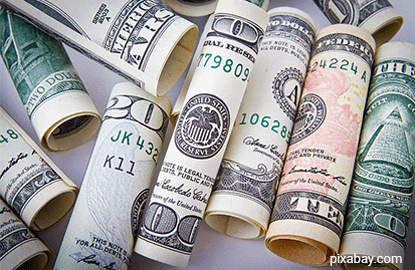
LONDON (Feb 15): The US dollar ground out an 11th straight daily rise on Wednesday, as investors' focus moved to inflation data in the United States for more support for the idea of a rise in Federal Reserve interest rates next month.
Fed chief Janet Yellen testifies for a second day in Congress after spurring more gains for the greenback by telling lawmakers on Tuesday that the US central bank would consider raising rates at one of its "upcoming" meetings.
For markets that pointed to a hike in either March or May. It also opens the door to the Fed raising the return for holding US dollars more than twice before the end of the year, beyond what investors have currently priced into short-term interest rates.
Consumer inflation is forecast to have risen to 2.4% in January and producer price numbers on Tuesday were generally higher than expected. The US dollar's run of daily gains is now its longest since the peak of the euro zone's debt crisis in 2012.
"After Yellen's testimony, CPI data are the pick of the week for the US," said Elsa Lignos, senior currency strategist with RBC Capital Markets.
"The risks are skewed to a higher print, particularly given the consumer component from yesterday's strong PPI data."
The CME FedWatch indicator puts the chances of a rise in March at just 17% but some market participants say pricing of market interest rates points to odds of 30% or more, rising to more than 50% for May.
The dollar index, which measures the greenback against its six major peers, was last up 0.2% at 101.43, its highest since Jan 20.
It rose 0.2% to 114.50 yen and a quarter of a percent to US$1.0552 per euro, its strongest in a month.
Elsewhere, the Swedish crown fell back into negative territory for the day after the Riksbank kept the door open to further action to reduce interest rates and cool the strength of the crown. It traded 0.2% weaker at 9.4635 per euro by 0911 GMT.
"The krona exchange rate continues to create uncertainty about the development in inflation," the central bank said.
"Since December, the krona has been clearly stronger than expected. This rapid appreciation is not expected to continue, however."